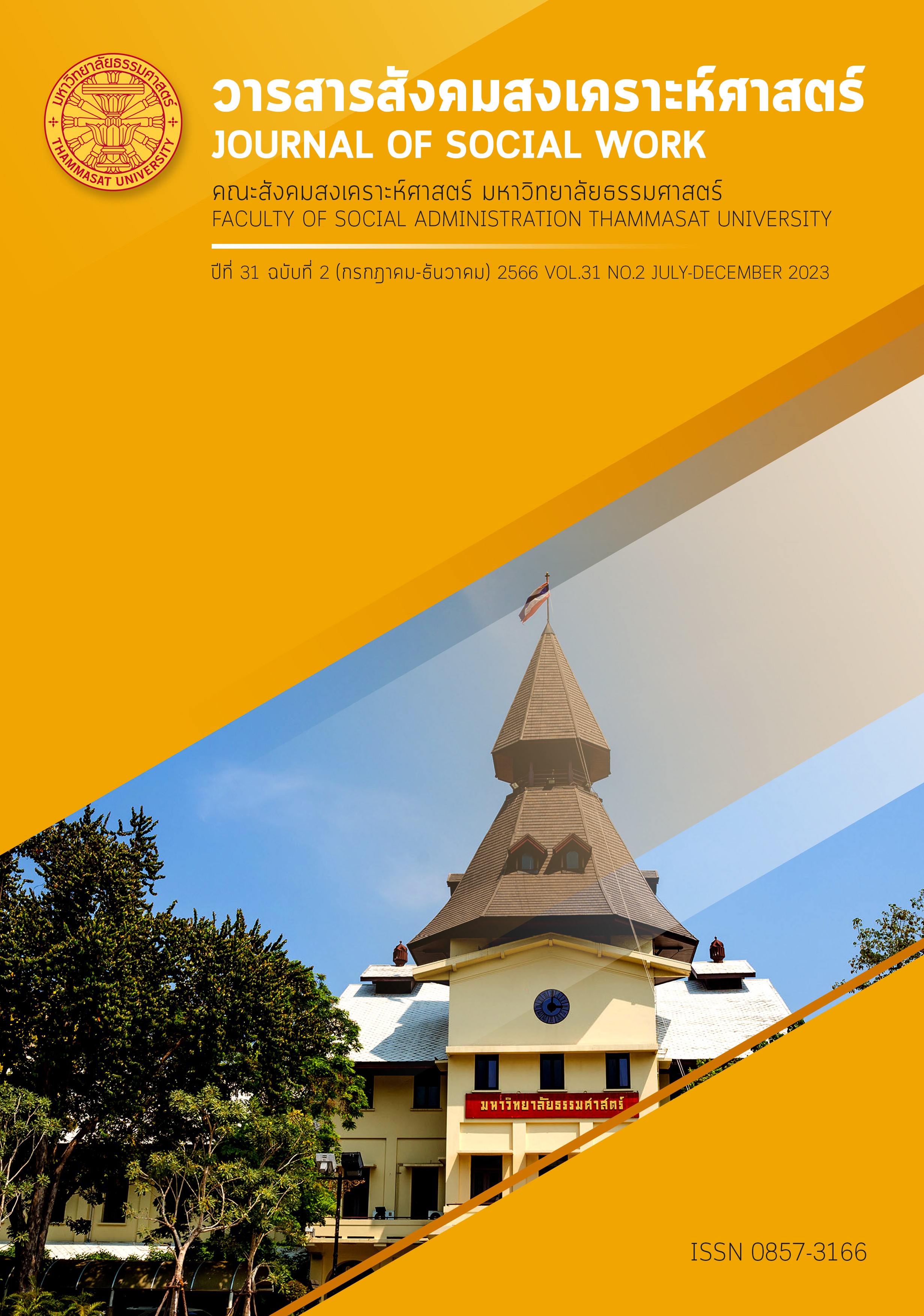Guidelines on Promotion and Development of Women Capabilities using Action Research: Country Park 15 water Hyacinth Processing Group, Bang Toei Sub-District, Sam Khok District in Pathum Thani
Keywords:
Promote and develop women's potential, Action research, Women's groupAbstract
This research article has three main objectives. First objective, to study the issues, needs and roles of women groups. Second objective, to provide promotion and development toward women potential through conducting action research with water hyacinth processing group, Mooban Country Park 15, Bang Toei Sub-District, Sam Khok District, Pathum Thani Province. Third objective, to collect data via group discussions and interviews with 20 women group members, observing participation and conduct activities with women group to support and develop potentials and extract lessons learned, analyzing data from contents derived from in-depth data from each activity with women group members. The members include group leader, community leader, women group members, external women network members and non-formal and informal education center network. Data will be a descriptive-based presentation. The research found that the group’s products have uneven manufacturing standards due to the different skills and expertise of the members based on different training and experience they received. The group members presented the need to develop skills of group members, conduct field studies at sites the members want to study the processing skills, adding value to the products. As for the roles of the group’s women, it is found there is a collective search for raw materials and markets to sell products produced by the members. Promotion and development of potential will be provided to women group via education, lessons, field visits, training on product processing, and online marketing. The development of guidelines on promotion and development of women potential is done by collective group process in set up questions and finding solutions and needs, presenting group’s work guidelines on group, and extracting lessons periodically. The group’s lesson learned has found that exchanging knowledge with the network, organizations, external agencies that meet the group’s needs will help the group find a method of work that allows group members to gain the opportunity to adjust a method of work tailored to each member. The proposal on promoting and supporting women group is to create confidence in the potential and ability of the members and involve them in every procedure, seeking network on promotion and development inside and outside the community and expand to collective action network in a form of partnership.
References
จารุวรรณ จินดามงคล. (2541). ผลการใช้โปรแกรมการเสริมสร้างพลังอำนาจต่อความสามารถในการเผชิญปัญหาของผู้ป่วยจิตเวช. วิทยานิพนธ์ปริญญามหาบัณฑิต, บัณฑิตวิทยาลัย จุฬาลงกรณ์มหาวิทยาลัย. กรุงเทพฯ.
ธีรนาถ กาญจนอักษร. (2542). หญิงชายกับการเปลี่ยนแปลงสังคม. กรุงเทพฯ: เอดิสันเพรสโปรดักส์.
ปรานี วงษ์เทศ. (2559). เพศและวัฒนธรรม. กรุงเทพฯ: สำนักพิมพ์นาตาแฮก.
ปาริชาติ วลัยเสถียร, สุทิตย์ อบอุ่น, สหัทยา วิเศษ, จันทนา เบญจทรัพย์ และชลกาญจน์ ฮาซันนารี. (2542). กระบวนการและเทคนิคการทํางานของนักพัฒนา. กรุงเทพฯ: สำนักงานกองทุนสนับสนุนการวิจัย (สกว.).
เมทินี พงษ์เวช. (2541). ผู้หญิงบนเส้นทางแห่งอำนาจและการตัดสินใจ. กรุงเทพฯ: สถาบันวิจัยบทบาทหญิงชายและการพัฒนา.
วรวิทย์ เจริญเลิศ. (2543). เศรษฐกิจไทยในระบบเศรษฐกิจโลกในพลวัตไทย: มุมมองจากเศรษฐศาสตร์การเมือง. กรุงเทพฯ: สำนักพิมพ์แห่งจุฬาลงกรณ์มหาวิทยาลัย.
วรรณดี สุทธินรากร. (2556). การวิจัยเชิงปฏิบัติการ: การวิจัยเพื่อเสรีภาพและการสรรค์สร้าง. กรุงเทพฯ: สยามปริทัศน์.
ศิริพร จิรวัฒน์กุล. (2546). การวิจัยเชิงคุณภาพในวิชาชีพการพยาบาล (พิมพ์ครั้งที่ 2). ขอนแก่น: ศิริภัณฑ์ ออฟเซ็ท.
สนธยา พลศรี. (2556). การพัฒนาความสามารถของบุคคลและกลุ่ม (พิมพ์ครั้งที่ 2). กรุงเทพฯ: โอเดียนสโตร์.
อภิญญา เวชยชัย. (2557). การเสริมพลังอำนาจในการปฏิบัติงานสังคมสงเคราะห์. กรุงเทพฯ: สำนักพิมพ์มหาวิทยาลัยธรรมศาสตร์.
อมรา พงศาพิชญ์ และ วิมลศิริ ชำนาญเวช. (2541). สถานภาพสตรีไทยทางกฎหมายและสังคม. กรุงเทพฯ: สำนักงานคณะกรรมการส่งเสริมและประสานงานสตรีแห่งชาติ สำนักงานปลัดสำนักนายกรัฐมนตรี.
Breeding. R. R. (2008). Empowerment as a function of contextual self-understanding: The effect of work interest profiling on career decision self-efficacy and work locus of control. Rehabilitation Counseling Bulletin, 51(2), 96-106. DOI: 10.1177/0034355207311346.
Czuba, C. E. (1999). Empowerment: what is it?. The Journal of Extension, 37(5). https://archives.joe.org/joe/ 1999october/comm1.php
Zimmerman, M. A. (2000). Empowerment theory; Psychological, Organizational, and Community levels of analysis. In J. Rappaport & E. Seidman (Eds.), Handbook of Community Psychology (pp. 46-63). Kluwer Academic Publishers. DOI: 10.1007/978-1-4615-4193-6_2
Downloads
Published
How to Cite
Issue
Section
License
Copyright (c) 2023 Journal of Social Work

This work is licensed under a Creative Commons Attribution-NonCommercial-NoDerivatives 4.0 International License.
The manuscripts published in the Social Work Journal is the copyright of the Social Work Journal, Thammasat University
Any article or opinion appeared in the Social Work Journal will solely be under the responsibility of the author The Faculty of Social Administration, Thammasat University and the editors do not need to reach in agreement or hold any responsibility.



